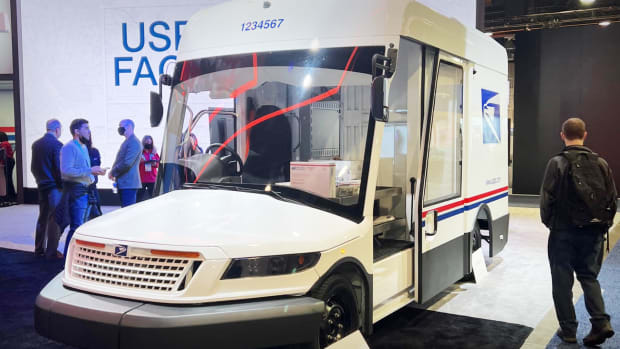The U.S. Post Office is putting the pedal down on its nearly $3 billion controversial vehicle project.
The Next Generation
The postal service said it placed its initial delivery order for its Next Generation Delivery Vehicle program with a division of Oshkosh Corp. (OSK) in Oshkosh, WI.
The first order calls for 50,000 vehicles, with a minimum of 10,019 battery electric vehicles, that's up from 5,000 originally planned by the service.
The order comes with a $2.98 billion price tag and a whole mailbag full of controversy. '
The project ran into a pothole after the Biden Administration urged the Postal Service to reevaluate its plans to electrify only 10% of its fleet of around 225,000 vehicles.
The White House was looking to pause and reevaluate the USPS contract.
President Joe Biden had pledged to transform the country's entire fleet of 645,000 vehicles into electric vehicles.

TheStreet
'Fiscally Prudent Decisions'
However, the post office deemed that there was "no legal or other basis to delay" to the program.
Postmaster General and USPS CEO Louis DeJoy said in a statement that "the Postal Service is fully committed to the inclusion of electric vehicles as a significant part of our delivery fleet even though the investment will cost more than an internal combustion engine vehicle."
"That said, as we have also stated repeatedly, we must make fiscally prudent decisions in the needed introduction of a new vehicle fleet," he continued.
DeJoy said the Postal Service "will continue to look for opportunities to increase the electrification of our delivery fleet in a responsible manner."
The majority of its current trucks have been in service for more than two decades.
The new vehicles will begin appearing on carrier routes in late 2023, the Postal Service said.
Last month, Virginia Rep. Gerry Connolly tweeted "DeJoy has to go right now" after the Environmental Protection Agency (EPA) and the White House Council on Environmental Quality issued letters urging the Postal Service to reconsider its decision.
"Louis DeJoy plans to spend billions on gas-powered vehicles despite clear goals set by @POTUS and Congress to electrify the federal fleet," he said. "I want a full examination of this contract, and I am pursuing a legislative remedy. But DeJoy has to go right now."
'Willfully Shortsighted Decision'
Earlier this month Connolly introduced legislation that would prohibit the Postal Service from carrying out any purchase of a new fleet of delivery vehicles unless 75% of the new vehicles are electric or otherwise emissions-free.
"Finalization of this contract is yet another willfully shortsighted decision by Postmaster General Louis DeJoy that will prevent the Postal Service from reaching its full 21st Century potential,” Connelly said in statement.
Oshkosh said in a statement that the contract allows the flexibility, when funding is provided, to increase the percentage of BEVs to be produced even after an order is placed.
During an earnings call with analysts in December, Oshkosh's president and CEO John Pfeifer, said the company was "very, very heavily weighted towards that contract.," adding that "we're going to be north of $300 million of CapEx for that program over the next couple of years," according to a transcript of the call.
The company said it will build the vehicles at its factory in Spartanburg, S.C., a move that has sparked controversy with union members in Wisconsin.
“The frustrating part is that Oshkosh isn’t doing the right thing," said Tim Jacobson, Chief Steward, UAW Local 578, according to WEAU News. "They were awarded this contract on the back of our workers. We are known for our quality work, our top of the line vehicles. We make them durable, reliable and we deliver on time."
Oshkosh said in a statement that it had "looked throughout Wisconsin to find an existing building that was large enough to build this vehicle."
"Wisconsin simply did not have any available buildings that could meet this requirement and given the strict timing requirements of this program, building a new facility was not feasible," the statement said.







